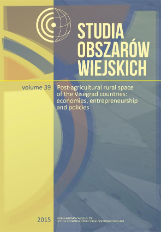Tytuł pozycji:
Post-agricultural rural space of the Visegrad countries: economies, entrepreneurship and policies
- Tytuł:
-
Post-agricultural rural space of the Visegrad countries: economies, entrepreneurship and policies
Studia Obszarów Wiejskich
Development policies on rural peripheral areas in Visegrad countries:a comparative policy analysis
- Autorzy:
-
Hruška, Vladan
Konopski, Michał
Csachová, Stela
Ferenc, Mariola
Kovács, Zoltán
- Słowa kluczowe:
-
peripheries
Wsie -- Polska -- 1990- -- czasopisma [KABA]
polityka regionalna
przystąpienie do Unii Europejskiej
regional disparities
Geografia
Polityka rolna -- Polska -- 1990- -- czasopisma [KABA]
regional policy
Visegrad countries
obszary wiejskie
peryferia
EU accession
kraje Wyszehradzkie
rural areas
Wsie -- czasopisma [KABA]
nierówności regionalne
- Data publikacji:
-
2015
- Wydawca:
-
PTG
IGiPZ PAN
- Język:
-
angielski
- Linki:
-
https://rcin.org.pl/dlibra/publication/edition/56667/content Link otwiera się w nowym oknie
- Prawa:
-
Licencja Creative Commons Uznanie autorstwa 3.0 Polska
Creative Commons Attribution BY 3.0 PL license
- Źródło:
-
http://195.187.71.2/ipac20/ipac.jsp?profile=geogpan&index=BOCLC&term=V
CBGiOŚ. IGiPZ PAN, sygn. Cz.4488
CBGiOŚ. IGiPZ PAN, call no. Cz.4489
http://195.187.71.2/ipac20/ipac.jsp?profile=geogpan&index=BOCLC&term=cc2002006510
CBGiOŚ. IGiPZ PAN, sygn. Cz.4489
CBGiOŚ. IGiPZ PAN, call no. Cz.4488
- Dostawca treści:
-
RCIN - Repozytorium Cyfrowe Instytutów Naukowych
-
Przejdź do źródła Link otwiera się w nowym oknie
24 cm
The main aim of this paper is to provide a comparative analysis of regional policies dealing with peripheral rural areas in the Visegrad countries from a historical perspective. As it is demonstrated in the paper despite the common political and ideological framework the goals and means of regional policy remained rather different in these countries during state-socialism. The systemic changes demanded the re-conceptualisation of regional development policy and the reconfiguration of the institutional background. As the comparative policy analysis showed in the early 1990s there was a lack of coherent regional policy that would efficiently mitigate growing regional disparities or foster regional competitiveness. The conceptual, legal and institutional foundation of the new regional policy took place in the second half of the 1990s, with some time lag among the countries. In the formulation of strategic documents regarding regional policy the foreseen EU accession played a very important role. The preparation of national development plans were based on the EU’s standardized development handbooks, therefore a considerable similarity among the new member states’ regional policy documents can be observed. One can say that earlier differences in regional development priorities were gradually eliminated by the European integration among the new member states. However, rural areas were considered in regional economic development policies only in the context of agriculture and tourism development. In addition to local infrastructural development, preservation of natural and cultural heritage, job creation only agriculture and tourism were defined for EU and national subsidies.
